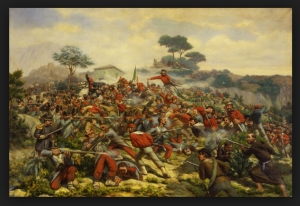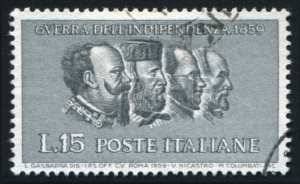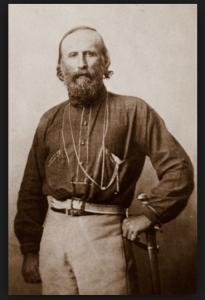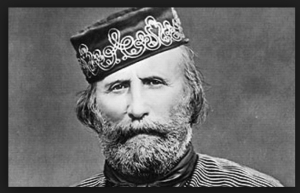Garibaldi the Abolitionist
In anticipation of the publication of Isthmus I believe it is important to learn about some of the significant historical figures who influenced the characters in this book and also would have had some impact on Emmy Evers and her family.
General Giuseppe Garibaldi and the Italian Risorgimento dominated the headlines of newspapers throughout the western world in the mid-nineteenth century. Garibaldi inspired liberal idealists internationally with his revolutionary exploits in South America and in Italy, and his victories in 1860 ended the Bourbon reign in Southern Italy and Sicily.

Garibaldi and his “One Thousand Men” in the battle of Calatafimi, Sicily, May 1860.
The passionate writings of the journalist-activist Giuseppe Mazzini kindled the fire, the diplomatic brilliance of Camillo Benso, Count of Cavour, the first Prime Minister of Italy, contained the elements, preventing the fire from burning out of control, the compromises of King Vitorio Emanuel II of Sardinia established the boundaries for the conflagration, and the inspirational battlefield victories under the leadership of Garibaldi fueled the fires to the finish. The Italian peninsula was finally unified as the Kingdom of Italy in 1861.

Victor Emanuel II, Garibaldi, Cavour, Mazzini
Garibaldi was a staunch abolitionist, an ardent proponent for universal suffrage, and proponent for the emancipation of women. During the American Civil War, he was offered a Major General’s commission in the United States Army through a letter from Secretary of State William H. Seward to H.S. Sanford, the U.S. Minister at Brussels. According to Italian historian Petacco, “Garibaldi was ready to accept Lincoln’s 1862 offer but on one condition: that the war’s objective be declared as the abolition of slavery. But at that stage Lincoln was unwilling to make such a statement lest he worsen an agricultural crisis.” On 6 August 1863, after the Emancipation Proclamation had been issued, Garibaldi wrote to Lincoln: “Posterity will call you the great emancipator, a more enviable title than any crown could be, and greater than any merely mundane treasure.”
Garibaldi’s revolutionary advocacy for liberal causes and dramatic upheaval in the social and political order fascinated many and kept the attention of the western world in the turbulent mid-nineteenth century. In Isthmus, we learn about Garibaldi and the social issues of the day through the back stories of three of the characters: Emilio Gattopardi, a Bourbon aristocrat sent on a diplomatic mission, his valet Ari Scarpello, a Garibaldi follower, and Scarpello’s wife, an Ecuadorian named Lita Perdellano-Scarpello.
I encourage you to read Widow Walk the first book in the Widow Walk Saga

